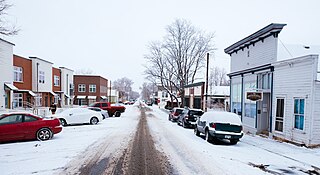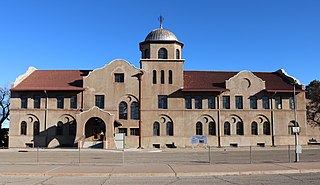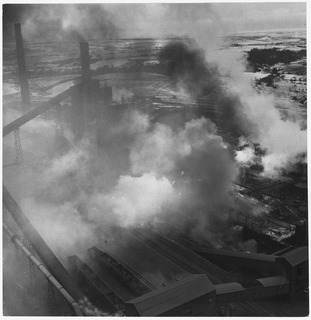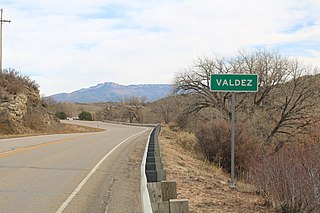
The City of Lafayette is a Home Rule Municipality located in southeastern Boulder County, Colorado, United States. The city population was 24,453 at the 2010 United States Census.

The Ludlow Massacre was a mass killing perpetrated by anti-striker militia during the Colorado Coalfield War. Soldiers from the Colorado National Guard and private guards employed by Colorado Fuel and Iron Company (CF&I) attacked a tent colony of roughly 1,200 striking coal miners and their families in Ludlow, Colorado, on April 20, 1914. Approximately 21 people, including miners' wives and children, were killed. John D. Rockefeller, Jr., a part-owner of CF&I who had recently appeared before a United States congressional hearing on the strikes, was widely excoriated for having orchestrated the massacre.

The human history of Colorado extends back more than 14,000 years. The region that is today the state of Colorado was first inhabited by Native American people. The Lindenmeier Site in Larimer County, Colorado, is a Folsom culture archaeological site with artifacts dating from approximately 8710 BC.

The Colorado Fuel and Iron Company (CF&I) was a large steel conglomerate founded by the merger of previous business interests in 1892. By 1903, it was mainly owned and controlled by John D. Rockefeller and Jay Gould's financial heirs. While it came to control many plants throughout the country, its main plant was a steel mill on the south side of Pueblo, Colorado and was the city's main industry for most of its history. From 1901 to 1912, Colorado Fuel and Iron was one of the Dow Jones Industrials. The steel-market crash of 1982 lead to the decline of the company. After going through several bankruptcies, the company was acquired by Oregon Steel Mills in 1993, and changed its name to Rocky Mountain Steel Mills. In January 2007, along with the rest of Oregon Steel's holdings, was acquired by EVRAZ Group, a Russian steel corporation, for $2.3 billion.
EVRAZ plc is a British multinational vertically integrated steel making and mining company with headquarters in London, England. It has operations mainly in Russia, but also in Ukraine, Kazakhstan, Italy, Czech Republic, the United States, Canada and South Africa. It is listed on the London Stock Exchange and is a constituent of the FTSE 100 Index. As of 2015, the ultimate beneficial owners were Roman Abramovich (31.03%), chairman Alexander Abramov (21.59%) and CEO Aleksandr Frolov (10.78%).

Pocahontas Coalfield, which is also known as the Flat Top-Pocahontas Coalfield, is located in Mercer County/McDowell County, West Virginia and Tazewell County, Virginia. The earliest mining of coal in the coalfield was in Pocahontas, Virginia in 1883 at Pocahontas Mine No. 1, now on the National Register of Historic Places.
Evraz Oregon Steel Mills is a subsidiary of the Russia steel producer Evraz Group and has operations in Portland, Oregon, United States, and also with facilities in Colorado and Alberta. The company produces items such as structural tubing, pipes, and steel rails.
Early coal mining in Colorado in the United States was spread across the state. Some early coal mining areas are currently inactive, including the Denver Basin and Raton Basin coal fields along the Front Range. There are currently 11 active coal mines, all in western Colorado.

The Consett Iron Company Ltd was an industrial business based in the Consett area of County Durham in the United Kingdom. The company owned coal mines and limestone quarries, and manufactured iron and steel. It was registered on 4 April 1864 as successor to the Derwent & Consett Iron Company Ltd. This in turn was the successor to the Derwent Iron Company, founded in 1840.

The Minnequa Steel Works Office Building and Dispensary are historic buildings in Pueblo, Colorado. The main office building served as headquarters of Colorado Fuel and Iron Company. The medical dispensary building served as a medical clinic for treatment of minor injuries and illnesses, and in later years, as both clinic and personnel office for the Colorado Fuel and Iron Company. Opened in 1902, the six-room Spanish Mission style building contained waiting, drug, consultation, surgical and storage rooms, in addition to sleeping and office quarters for attending physicians. In 1902, as the company payroll exceeded 5,000 employees, the Dispensary handled an average of seventy-five cases daily. As employee numbers grew, medical staff also began treating families of employees. The building was used as a medical building for mill employees until the early 1990s. The Minnequa Steelworks Office Building, built in 1901, served as company headquarters until the early 1990s. Here, many office functions occurred including purchasing, finance, payroll, engineering, and other administrative functions. The building complex was listed on the National Register of Historic Places in 2002, amended to the National Level of Significance of the National Register of Historic Places in 2008, and was designated a National Historic Landmark in 2021. Owned and operated by the Steelworks Center of the West, the medical dispensary building is the home of the Steelworks Museum of Industry and Culture, which opened on January 19, 2007. The museum's exhibits include the local history of coal mining, steel production, railroads, labor, and the impact of the Colorado Fuel and Iron Company on the region. The main administration building will serve as the second phase of the Steelworks Museum of Industry and Culture in the coming years.

The Steelworks Museum is located in Pueblo, Colorado. Operated by the Steelworks Center of the West, the museum is in the historic Minnequa Steel Works Office Building and Dispensary of the Colorado Fuel and Iron Company.
The Rocky Mountain Fuel Company was a coal mining company located in Colorado, operating mines in Louisville, Lafayette, and other locations northwest of Denver. The company also operated mines in Las Animas, Routt, Garfield and Gunnison counties. During the 1930s, the company was the second-largest producer of coal by volume in the state of Colorado. However, the company was severely impacted by the Great Depression, declining productivity of local coal deposits, and the increased popularity of natural gas, and went bankrupt in 1944.
South Pueblo, Colorado used to be a city in Colorado. It was one of three towns, in addition to Central Pueblo and Bessemer, that were later incorporated into Pueblo, Colorado.

John Cleveland Osgood was a self-made man who founded the Colorado Fuel and Iron Company and Victor-American Fuel Company but has been referred to as a robber baron. He also created Redstone, Colorado.

The Colorado Coalfield War was a major labor uprising in the southern and central Colorado Front Range between September 1913 and April 1914. Striking began in late summer 1913, organized by the United Mine Workers of America (UMWA) against the Rockefeller-owned Colorado Fuel and Iron (CF&I) after years of poor working conditions. The strike was marred by targeted and indiscriminate attacks from both strikers and individuals hired by CF&I to defend its property. Conflict was focused in the southern coal-mining counties of Las Animas and Huerfano, where the Colorado and Southern railroad passed through Trinidad and Walsenburg. It followed the 1912 Northern Colorado Coalfield Strikes. While the entirety of the strike-related violence is also commonly called the "Colorado Coal War" and the "Colorado Civil War," some historians use these terms only to refer to the final ten days of intense fighting at the end of April.

Valdez is an unincorporated community and a census-designated place (CDP) located in and governed by Las Animas County, Colorado, United States. From 1907 to 1960, to Valdez served as a company town for Colorado Fuel & Iron and its Frederick coal mine, the company's most productive and second largest. The population of the Valdez CDP was 47 at the United States Census 2010. The Trinidad post office serves the area.

The Steelworks Center of the West, is a non-profit organization focused on preserving the history of the coal and steel industry in the Western United States. Based in Pueblo, Colorado and formerly known as the Bessemer Historical Society, which took its name from the community of Bessemer, site of the Colorado Coal and Iron Bessemer Works which was named after the Bessemer process for making steel invented by Henry Bessemer.

Primero is a ghost town in Las Animas County, Colorado, United States. The community was a company coal mining town for the Colorado Fuel and Iron Company during the early 20th century.
Victor-American Fuel Company, also variously styled as the Victor American Fuel Company and Victor Fuel Company, was a coal mining company, primarily focused on operations in the US state of Colorado during the first half of the Twentieth Century.

Berwind is a ghost town in Las Animas County, Colorado, nestled in Berwind Canyon 3.1 miles (5.0 km) southwest of Ludlow and 15 miles (24 km) northwest of Trinidad. The settlement was founded in 1888 as a company town for the Colorado Coal & Iron Company and, from 1892, was operated by the Colorado Fuel & Iron Company. It was a battle site in October 1913 and April 1914 during the Colorado Coalfield War, housing a Colorado National Guard encampment during the latter stages of the conflict.











